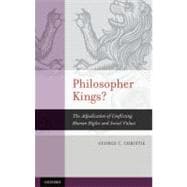
Note: Supplemental materials are not guaranteed with Rental or Used book purchases.
Purchase Benefits
What is included with this book?
| Acknowledgments | p. xi |
| Preface | p. xiii |
| Prolegomena | p. 1 |
| Introduction | p. 3 |
| "Rights" Discourse | p. 13 |
| Structural Impediments to Consistent Application of "Universal" Human Rights | p. 21 |
| The Difficult Issues | p. 35 |
| The Enlarged View of Rights in Contemporary Constitutions and Human Rights Conventions-The Notion of Defeasible Rights | p. 37 |
| Litigation Involving a Conflict of Rights, Each of Equal Value | p. 51 |
| The Limited Help From Philosophy And The Social Sciences | p. 75 |
| The Epistemology of Judicial Decision Making | p. 77 |
| The Unsuccessful Attempt to Find a Philosophical "North Star" to Aid in Judicial Decision Making | p. 89 |
| The Use of Balancing Tests and Factor Analysis-The Inevitable Tendency to Resort to Bright-Line Tests | p. 105 |
| Case-By-Case Adjudication | p. 117 |
| An Overview of Case-by-Case Adjudication, Its Possible Goals and the Influence of Legal Traditions | p. 119 |
| The Optimal Conditions for Case-by-Case Adjudication and Its Limits | p. 129 |
| Case-by-Case Adjudication of Contentious Human Rights Controversies | p. 147 |
| Conclusion | p. 165 |
| What If We Must Choose? | p. 167 |
| Bibliography | p. 177 |
| Table of Cases | p. 183 |
| Index | p. 189 |
| Table of Contents provided by Ingram. All Rights Reserved. |
The New copy of this book will include any supplemental materials advertised. Please check the title of the book to determine if it should include any access cards, study guides, lab manuals, CDs, etc.
The Used, Rental and eBook copies of this book are not guaranteed to include any supplemental materials. Typically, only the book itself is included. This is true even if the title states it includes any access cards, study guides, lab manuals, CDs, etc.